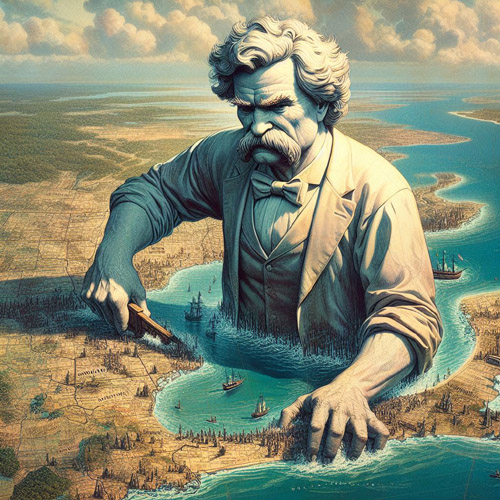

| The Mississippi River will always have
its own way; no engineering skill can persuade it to do otherwise; it has
always torn down the petty basketwork of the engineers and poured its giant
floods withersoever it chose, and it will continue to do this. - Mark Twain in Eruption |
 AI image by R. Kent Rasmussen |
- interview in Chicago Tribune, 9 July 1886 |
|
In the space of one hundred and seventy-six years the
Lower Mississippi has shortened itself two hundred and forty-two miles.
That is an average of a trifle over one mile and a third per year. Therefore,
any calm person, who is not blind or idiotic, can see that in the Old
Oolitic Silurian Period, just a million years ago next November, the Lower
Mississippi River was upwards of one million three hundred thousand miles
long, and stuck out over the Gulf of Mexico like a fishing-rod. And by
the same token any person can see that seven hundred and forty-two years
from now the Lower Mississippi will be only a mile and three-quarters
long, and Cairo and New Orleans will have joined their streets together,
and be plodding comfortably along under a single mayor and a mutual board
of aldermen. There is something fascinating about science. One gets such
wholesale returns of conjecture out of such a trifling investment of fact.
- Life on the Mississippi |
|
|
...all men--kings & serfs alike--are slaves to other men & to
circumstance--save alone, the pilot--who comes at no man's back and call,
obeys no man's orders & scorns all men's suggestions. The king would
do this thing, & would do that: but a cramped treasury overmasters
him in the one case & a seditious people in the other. The Senator
must hob-nob with canaille whom he despises, & banker, priest &
statesman trim their actions by the breeze of the world's will & the
world's opinion. It is a strange study,--a singular phenomenon, if you
please, that the only real, independent & genuine gentlemen in the
world go quietly up and down the Mississippi river, asking no homage of
any one, seeking no popularity, no notoriety, & not caring a damn
whether school keeps or not. |
Jefferson City, Missouri. Original artwork by Gari Melchers. Photo courtesy Dave Thomson |
LIFE ON THE MISSISSIPPI Harper & Bros. 1917 |
When I find a well-drawn character in fiction or biography I generally
take a warm personal interest in him, for the reason that I have known
him before--met him on the river.
|
Many more materials on Mark
Twain's Mississippi River are available via archive.org
from Northern Illinois University's website.
Quotations | Newspaper Articles | Special Features | Links | Search